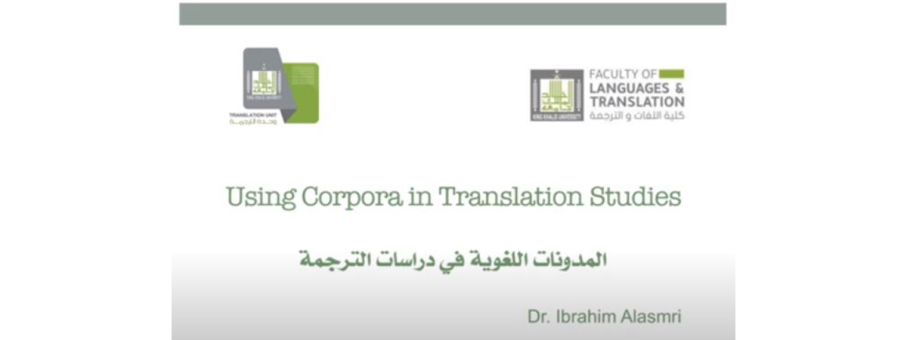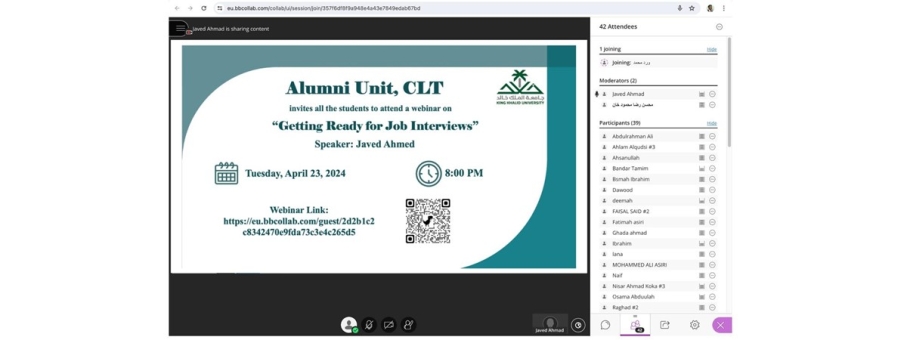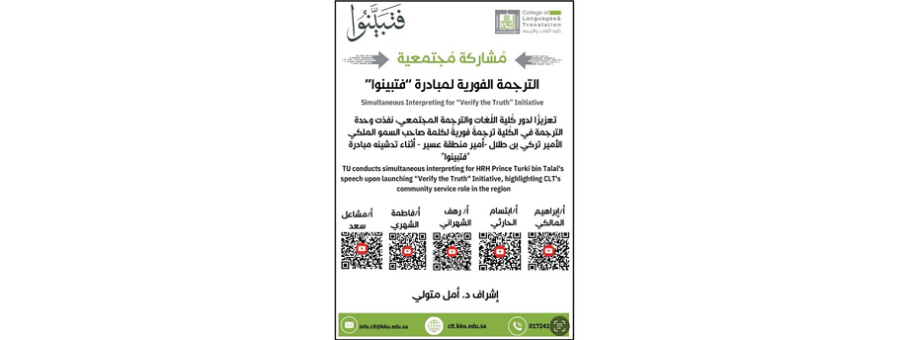On December 4, 2023, the Translation Unit within the Faculty of Languages & Translation held a workshop entitled "Using Corpora in Translation Studies." The session, led by Dr. Ibrahim Alasmri, Assistant Professor of Translation Studies and Vice Dean of Educational Affairs & Development at the Faculty, was designed to enlighten participants on the application of corpora in translation studies. Additionally, it offered practical insights into conducting corpus-based research in translation, marking a significant step in advancing academic inquiry in this field.
The session commenced with Dr. Alasmri elucidating the concepts of "Corpora," "Corpus Linguistics," and "Empiricism." He explained that corpora consist of extensive, systematically organized text collections pivotal for linguistic analysis and research. Furthermore, he elaborated on "Corpus Linguistics" as a linguistic study based on these corpora, underlining its reliance on empirical evidence and a data-driven analytical approach.
Dr. Alasmri defined Translation Studies as an interdisciplinary domain integrating linguistic, cultural, and cognitive aspects. This definition aligns with the comprehensive scope of translation research, encompassing not just linguistic analysis, but also cultural and cognitive elements. He emphasized the importance of Corpus-based Translation Studies (CBTS), spotlighting the use of empirical data to unravel insights into translation processes and strategies. This approach, as Dr. Alasmri illustrated, underscores the critical role of evidence-based analysis in both comprehending and enhancing translation practices.
The workshop delved deeply into practical aspects of Corpus-Based Translation Studies (CBTS). It outlined crucial steps including selecting appropriate corpora, formulating research questions, data collection and analysis, results interpretation, and the use of specialized corpus tools and software in translation research. This session offered participants hands-on methodologies and essential tools for effective corpus-based investigation in translation studies.
Besides the key topics, the workshop explored the domain of corpus linguistics, which entails analyzing linguistic data using extensive text collections, known as corpora. This part of the session underscored the reliance on computer software and statistical methods to discover linguistic patterns and extract information from texts. Dr. Alasmri further introduced the concept of empiricism in linguistics. He stressed the value of empirical evidence and observations gleaned from real-world data for making informed conclusions about language functionality.
The workshop comprehensively addressed the application of corpora across multiple disciplines. This included linguistic analysis, language variation and change, lexicography, pragmatics and discourse analysis, language teaching and learning, stylistics and literary analysis, translation studies, computational linguistics and natural language processing, forensic linguistics, and social and cultural studies. In addition, the session briefly explored significant historical shifts in Translation Studies, notably the linguistic turn influenced by structural linguistics, providing a broader context for understanding the evolution and current trends in the field.
In summary, the workshop offered substantial insights into utilizing corpora within the realm of translation studies. It equipped participants with practical knowledge and methodologies essential for conducting corpus-based translation research, thereby enhancing their understanding and skills in this specialized field.
The workshop proved to be a resounding success, attracting a diverse and engaged audience comprising researchers, students, and translators from a variety of backgrounds. The active participation and the depth of thought-provoking questions posed at the workshop's conclusion highlighted the importance of collaborative and interdisciplinary dialogue in Translation Studies. This event went beyond mere knowledge dissemination; it fostered a sense of community and a shared enthusiasm for ongoing exploration and research in the field. Furthermore, the workshop's influence transcended the confines of the immediate presentations and discussions. It served as a vital platform for networking, exchanging ideas, and sparking inspiration for future research initiatives.
For those interested in delving deeper into the discussions and presentations of the workshop, a recording is available on YouTube. To view this webinar, please click here.
Date: 12/4/2023
Source: Faculty of Languages and Translation






